Advantages of Personalized Senior Support in Hybrid Care Models

Revolutionizing Senior Care Through Personalization and Flexibility
The landscape of senior healthcare is evolving rapidly, driven by technological advancements and a deeper understanding of individual needs. Hybrid care models, combining in-person and digital services, alongside personalized care plans, are transforming how support is delivered to older adults. This comprehensive approach aims to improve health outcomes, promote independence, and enhance quality of life for seniors, making care more accessible, efficient, and tailored to each individual's unique circumstances.
Customized Care Planning Enhances Safety, Comfort, and Independence
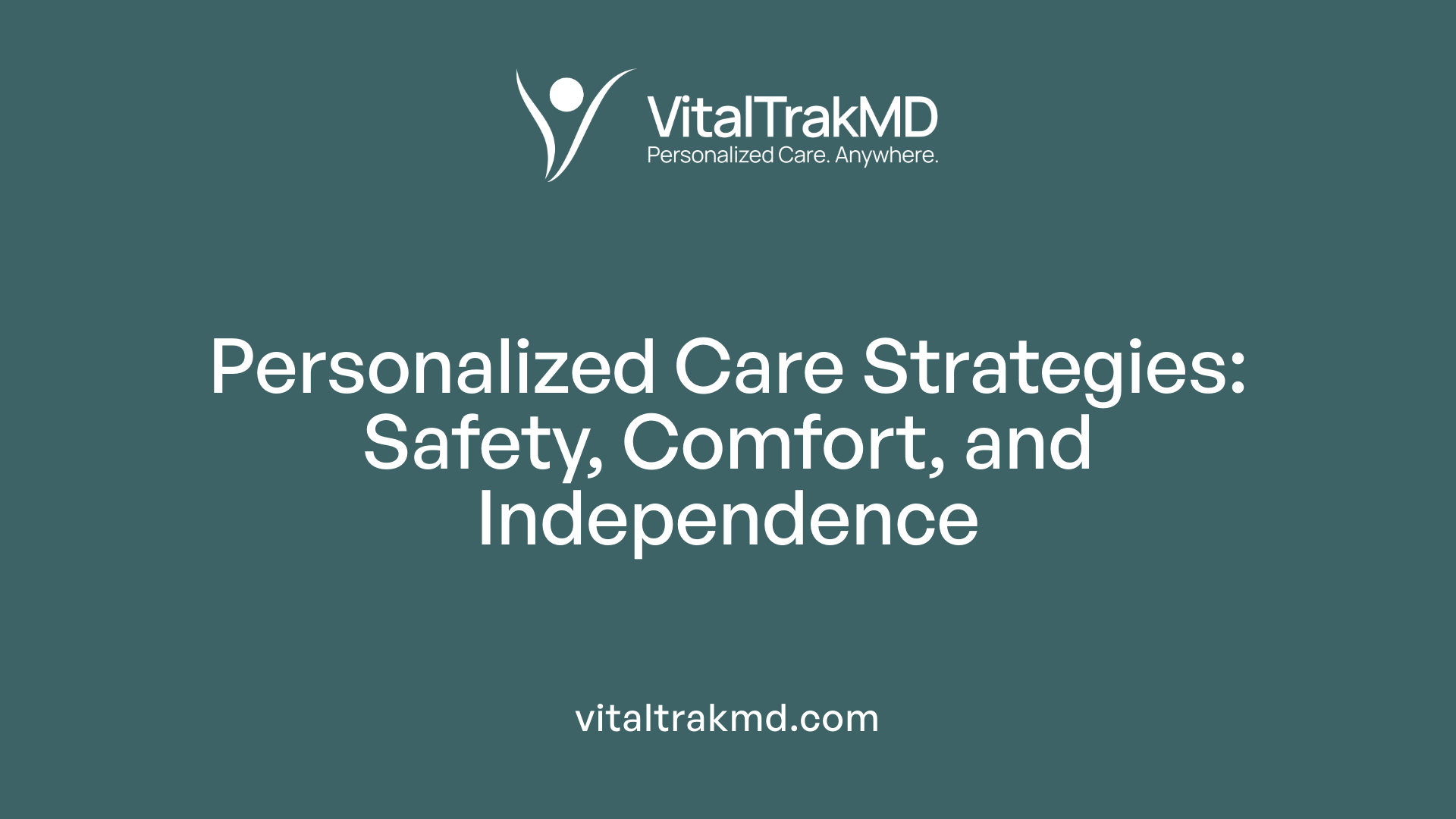
What are the advantages of customized care planning for seniors?
Personalized care plans are designed specifically to meet an individual senior’s unique needs, making a significant difference in their overall quality of life. By focusing on the person’s specific medical conditions, emotional state, and daily routines, these plans help promote greater independence and comfort.
One of the main benefits is increased safety. These plans often include thorough home safety assessments and necessary modifications, such as installing grab bars or removing tripping hazards, which significantly reduce the risk of falls and accidents.
Medication management and early health interventions are also prioritized within personalized plans. Regular monitoring and tailored support help in managing chronic diseases effectively, catching potential health issues early, and preventing hospital readmissions.
Emotional and mental well-being are equally supported through companionship services, social engagement activities, and cognitive stimulation, all incorporated into the care strategy. This holistic approach ensures seniors maintain their dignity and connection to the community.
Flexibility is another core feature. Care plans are adaptable with evolving health needs or changes in personal preferences, allowing caregivers and families to make timely adjustments.
Overall, personalized development and execution of these plans lead to more efficient healthcare delivery, better health outcomes, and increased safety, comfort, and independence for seniors. They not only help seniors live more fulfilling lives but also provide peace of mind for their families, knowing that their loved ones are receiving tailored, comprehensive care.
| Aspect | Benefit | Additional Detail |
|---|---|---|
| Medical and emotional needs | Holistic support for overall well-being | Includes mental health and social engagement activities |
| Home safety assessments | Reduced risk of injuries | Modifications tailored to individual home environments |
| Medication and health monitoring | Prevents complications and promotes recovery | Early intervention and disease management strategies |
| Emotional support | Enhances mental health and loneliness reduction | Companionship services and cognitive activities |
| Adaptability of plans | Meets changing needs over time | Seamless updates as health conditions or preferences shift |
This person-centered approach, supported by healthcare professionals and family members, ensures that each senior’s journey is respected, supported, and optimized for the best possible experience.
The Role of Digital and Human Touch in Hybrid Elder Care
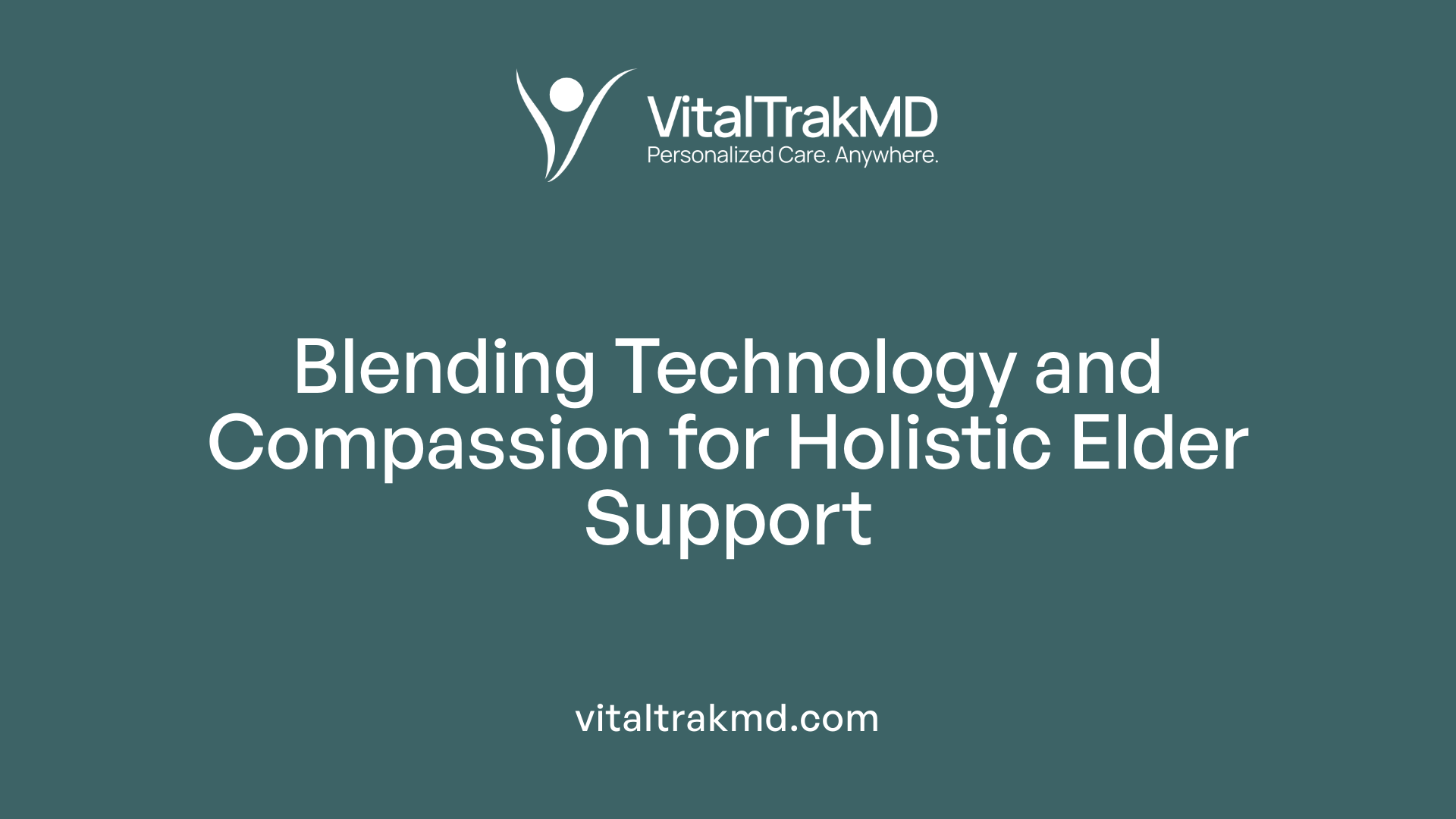
How do hybrid healthcare systems improve support for seniors?
Hybrid healthcare models blend digital solutions such as telemedicine, remote monitoring, and online care platforms with traditional in-person visits and hands-on caregiving. This approach creates a flexible, customized care pathway that adapts to individual needs.
One major benefit is increased accessibility. Seniors can receive regular health checkups and support without leaving their homes, which is especially valuable for those with mobility issues or living in remote areas. Digital tools allow for constant health monitoring, early detection of issues, and prompt adjustments to treatment plans.
In addition to virtual care, in-person visits remain crucial for physical assessments, personal companionship, and support with daily tasks. Caregivers provide essential emotional and physical assistance, ensuring seniors feel connected and safe.
This blended system also emphasizes emotional well-being. Regular virtual check-ins foster social engagement, reducing loneliness and promoting mental health. In-home caregivers can offer companionship, physical activity encouragement, and cognitive stimulation.
Adapting to changing health needs is another advantage. Care plans can be modified easily based on ongoing assessment results, allowing seniors to comfortably age in place while maintaining independence.
Furthermore, hybrid models make the entire healthcare delivery process more efficient and sustainable. They reduce unnecessary hospital visits, lower healthcare costs, and improve overall patient experience by offering multiple channels of communication and care.
Integrating various elements for comprehensive elder care
| Aspect | Function | Benefit |
|---|---|---|
| Telemedicine & Remote Monitoring | Continuous health tracking, virtual consultations | Early intervention, reduced hospital readmissions |
| In-person Visits & Support | Physical assessments, daily assistance | Personalized physical and emotional care |
| Emotional & Social Care | Virtual companionship, caregiver interaction | Mental health support, reduced loneliness |
| Care Model Flexibility | Adjustments based on individual needs | Promotes independence, enhances comfort |
By combining these elements, hybrid elder care creates a resilient, adaptable system that effectively meets the diverse needs of seniors. It promotes aging with dignity and provides families peace of mind, knowing their loved ones are supported both physically and emotionally.
Search terms for more information
hybrid healthcare models senior support, telemedicine advantages, in-home care
Enhancing Quality of Life Through Flexible and Accessible Care
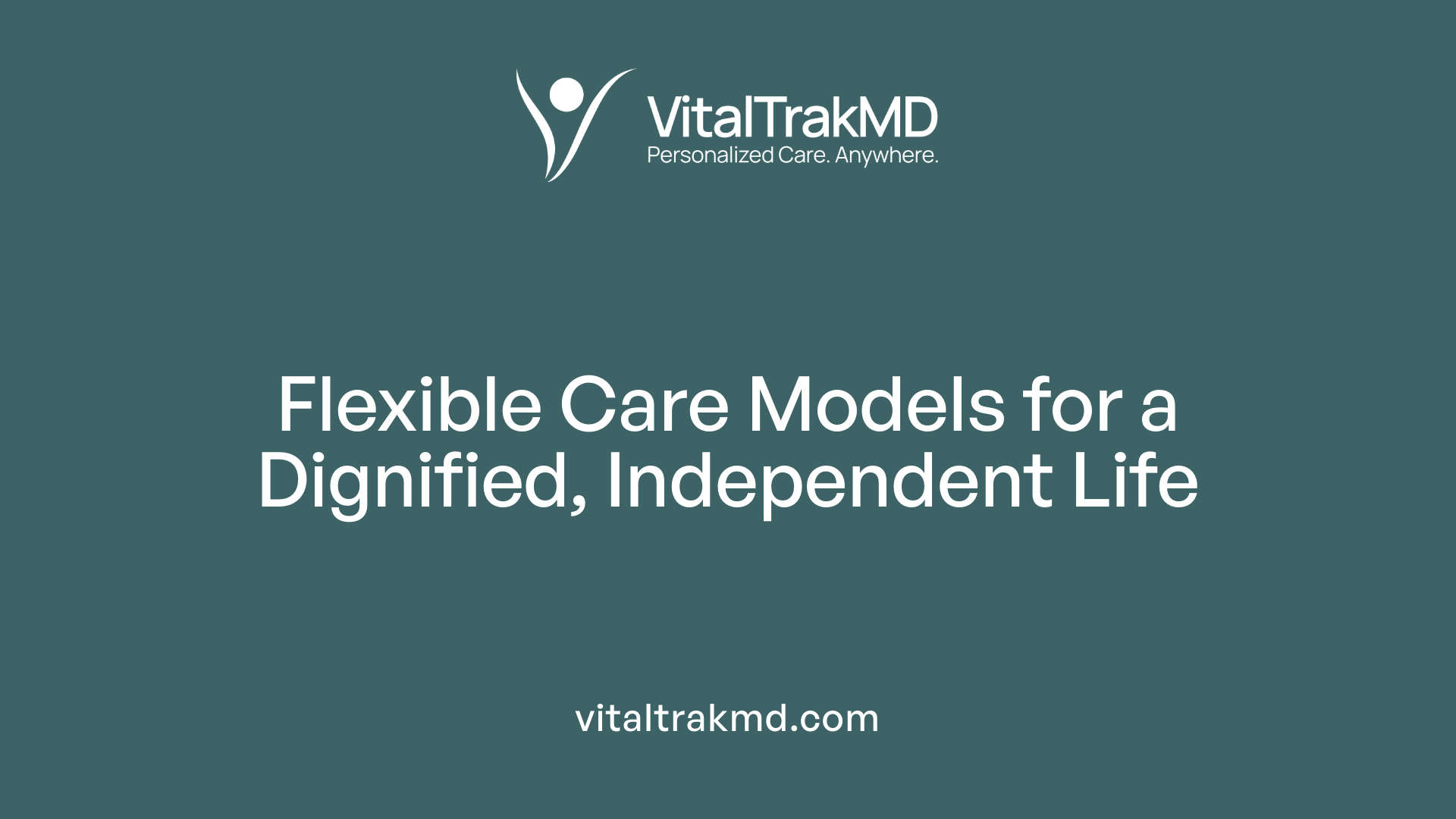
How does combining in-person and remote healthcare services enhance senior care?
The integration of in-person and remote healthcare services, known as hybrid care models, offers numerous benefits for seniors. This approach significantly improves accessibility, particularly for those who are vulnerable or live in remote areas. By blending physical visits with telehealth consultations, seniors can enjoy flexible scheduling and ongoing health monitoring without frequent trips to healthcare facilities.
This combination is especially effective for managing chronic health conditions and preventing deterioration by enabling early detection of issues. For example, remote monitoring devices can alert caregivers to health changes before symptoms worsen, reducing emergency visits and hospital admissions.
Furthermore, hybrid care bridges gaps in healthcare access across different populations, including racial and ethnic minorities, by overcoming transportation barriers and technological limitations. Many seniors appreciate the convenience and comfort of receiving care from their homes while still maintaining the personal connection through in-person visits when necessary.
Patient satisfaction surveys consistently show high approval for hybrid models, as they offer a balanced and personalized approach. Seniors feel more in control of their health, which supports better adherence to treatment plans and overall well-being. This model promotes not only physical health but also social and emotional stability, ultimately allowing older adults to maintain independence, dignity, and a higher quality of life.
Supporting long-term management and reducing hospital visits
The continual engagement enabled by hybrid care ensures ongoing support for managing long-term conditions like diabetes, heart disease, and mobility issues. Early intervention and proactive adjustments can prevent complications, thus reducing the need for costly hospital stays.
Telehealth also facilitates timely medical advice, medication management, and cognitive support, fostering a proactive care environment. By reducing the frequency of hospital visits and enabling home-based management, healthcare systems can save costs while maintaining patient health.
Cost savings for patients and healthcare systems
Incorporating remote care options cuts expenses related to transportation, hospital stays, and emergency interventions. Patients experience reduced out-of-pocket costs, and healthcare providers can allocate resources more efficiently.
Implementing hybrid models also enhances system resilience, providing flexible capacity during health crises or system overloads. This adaptability not only supports individual patient needs but also contributes to a more sustainable and responsive healthcare infrastructure.
Broader Benefits of Hybrid and Personalized Care for the Elderly Population
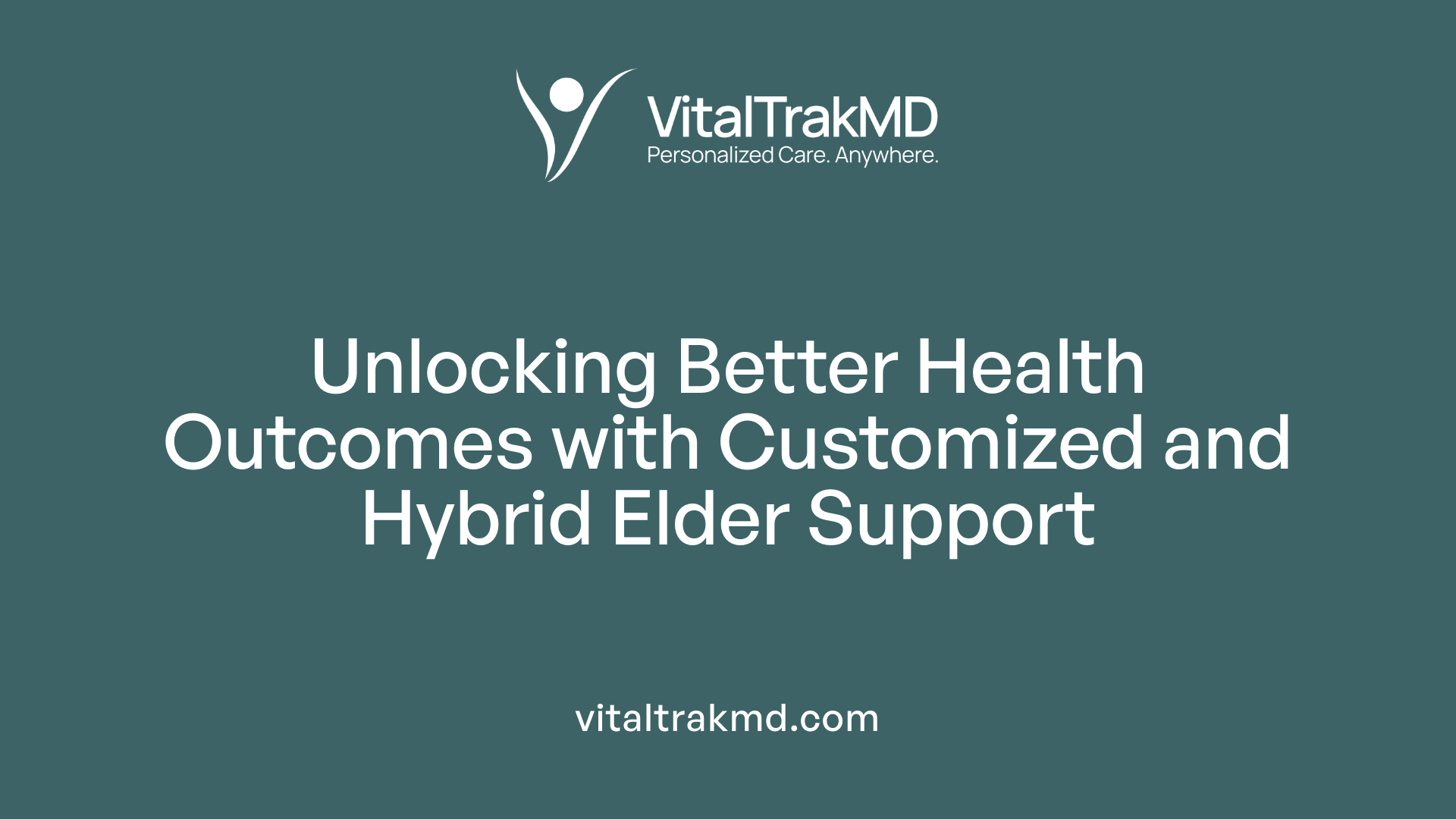
How do personalized and hybrid care models benefit seniors?
Personalized and hybrid care approaches offer numerous advantages for older adults, focusing on individual needs and promoting greater independence. These models tailor support to the person’s medical, emotional, and daily living requirements, which helps improve overall well-being.
One of the main benefits is cost efficiency. By reducing unnecessary hospital visits and hospital stays, these models lower healthcare expenses for families and providers. Remote monitoring and telehealth services enable early intervention, preventing health crises and decreasing costly emergency care.
In rural and underserved areas, hybrid care enhances healthcare access. Seniors who might face transportation difficulties or live far from clinics can receive consistent support through virtual visits and remote health management. This ensures continuous care regardless of location.
Reducing hospital readmissions is another significant advantage. Regular remote check-ins and proactive management of chronic conditions help identify warning signs early, enabling timely interventions that can prevent hospitalization.
Family involvement is also strengthened. Digital tools facilitate regular communication, allowing loved ones to stay informed and participate in care decisions. This collaborative approach offers peace of mind to families, knowing their loved ones are supported securely and comfortably at home.
Summarizing the Impact
| Benefit | Description | Additional Details |
|---|---|---|
| Cost savings | Lowered healthcare expenses through fewer hospital stays | Reduced emergency visits and resource use |
| Care in underserved areas | Enhanced geographic reach with virtual health technology | Especially valuable in remote regions |
| Reducing hospital readmissions | Early detection and proactive care to avoid hospital transfers | Remote monitoring and regular check-ins |
| Family involvement & peace of mind | Continuous updates and engagement for loved ones | Digital communication tools improve support |
These flexible, person-centered care models contribute to a healthier, more connected, and less stressful aging experience, ensuring that seniors receive personalized support while maintaining their dignity and independence.
The Future of Elder Care: A Holistic, Patient-Centered Approach
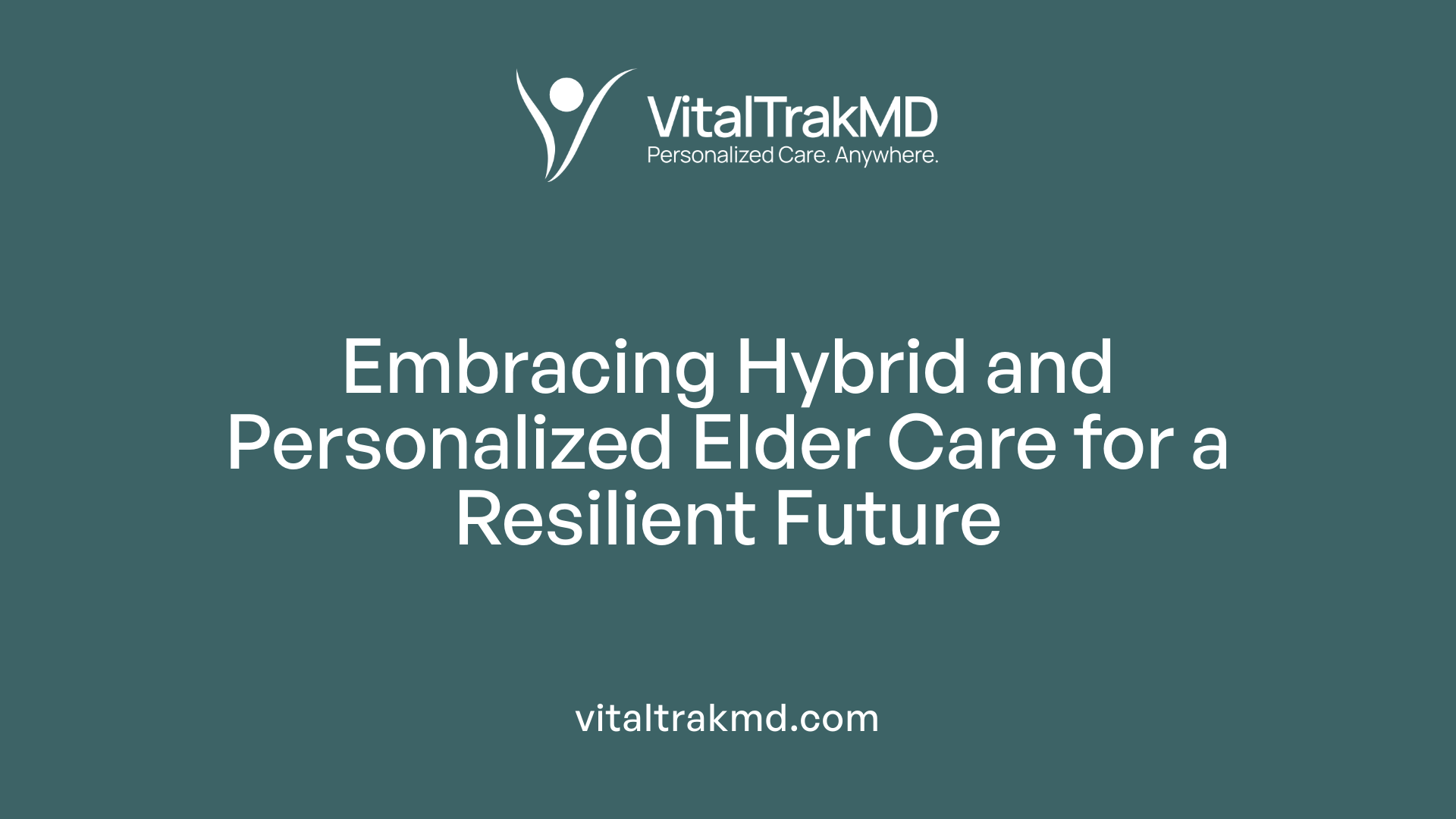
What are the overall benefits of implementing hybrid care models for senior support?
Hybrid care models blend in-person and virtual healthcare services to create a flexible, patient-centered approach to elder support. This integration allows seniors to receive continuous and tailored care that adapts to their changing needs over time.
One significant advantage is improved monitoring of chronic conditions through remote sensors, telemedicine consultations, and digital health platforms. This proactive oversight helps prevent complications, reduces hospital visits, and supports aging in place—maintaining independence and comfort.
Another benefit is increased convenience for seniors. By decreasing the need for transportation and eliminating long wait times, hybrid models enhance overall satisfaction and engagement with healthcare. This approach also offers timely interventions, catching health issues early when they are most manageable.
Operationally, healthcare providers experience less burnout and reduced costs due to the efficiency of virtual care pathways. Moreover, remote services expand access for seniors in remote or underserved areas, ensuring that quality support is widely available.
Overall, hybrid elderly care fosters a resilient, efficient, and personalized healthcare system. It empowers seniors to maintain autonomy while ensuring they receive the comprehensive support necessary for a healthier, more connected life.
| Aspect | Benefits | Additional Details |
|---|---|---|
| Personalization | Tailored care plans | Developed through collaboration among care teams, families, and patients |
| Flexibility | Mode of care | Combines physical and virtual modes, adaptable to changing health needs |
| Accessibility | Increased reach | Especially beneficial for remote or mobility-challenged seniors |
| Cost Efficiency | Reduced expenses | Decreases transportation and facility costs, reduces readmissions |
| Well-being | Enhanced satisfaction | Maintains dignity, promotes independence, and improves mental health |
| Technology Use | Supportive tools | Telehealth, remote monitoring, mobile apps, and online education |
This evolving approach emphasizes holistic, person-centered elder care that leverages digital transformation to improve overall health outcomes and quality of life.
The Future of Elder Support Lies in Flexibility and Personalization
As the healthcare landscape advances, the integration of personalized plans and hybrid models creates a more resilient, responsive, and compassionate system. By leveraging technology alongside human touch, elder care can be tailored to maximize independence, health, and overall well-being. Embracing these innovative solutions not only improves individual outcomes but also enhances healthcare system efficiency, making support more accessible and adaptable to the diverse needs of the aging population.
References
- Customized Care at Home: The Benefits of Personalized ...
- The Benefits of Personalized Senior Care Plans
- Designing for flexibility in hybrid care services - PubMed Central
- What Is Hybrid Healthcare? | Tools, Benefits, and Solutions
- Benefits of Personalized Care at Home for Seniors
- How Personalized In-Home Care can Improve Seniors ...
- What Is Hybrid Healthcare? | Tools, Benefits, and Solutions
- Comparing In-Person Only, Telemedicine Only, and Hybrid ...
Recent articles
Want to Feel Better and Live Healthier?
Join hundreds of patients taking control of their health with personalized care that fits their life – not the other way around.
Rated 4.8/5 by 32+ customers







